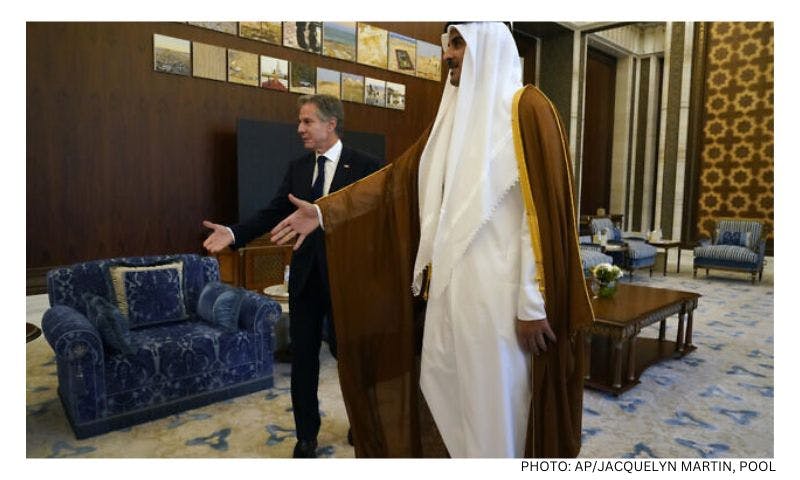Published: 10 September 2021
Last updated: 4 March 2024
SAM BAHOUR: Unless one seeks the truth, it is easy to fall for the hasbara-messaging such as ‘shrinking the conflict’ or ‘economic peace’ that Bennett keeps repeating
ISRAEL'S NEW GOVERNMENT is in full swing, with Prime Minister Naftali Bennett at its head. Now that Bennett has made his maiden trip to the White House as prime minister, one can confidently, albeit regretfully, acknowledge that nothing has really changed except the personalities.
In Middle East politics, personalities are a sideshow. They can change frequently or remain in place for decades, and their global legitimacy standing will be the exact same. Being viewed as legitimate should not be confused with having popular legitimacy that allows one to lead.
For very different reasons, Israeli and Palestinian leaders face this same dilemma; they are viewed as legitimate from abroad but fall short of minimum popular legitimacy at home to move the needle on any substantial issue, let alone the stubbornest needle of all, that of the Israeli military occupation of the West Bank, East Jerusalem, and the Gaza Strip.
Bennett allowing himself to come to power on the back of the United Arab List says more about political opportunism than it does about Israel’s democracy.
Fifty-four years into this occupation, and counting, Bennett has entered the scene to announce loud and clear what every previous Israeli government since its founding has said or stood for - no Palestinian state. Like President Trump, Bennett does not mince his words, and as with Trump, that does not mean his words are worth any more than the next news cycle’s headlines.
Bennett is a known commodity; once the head of a prominent Jewish settler group, he served as Minister of Diaspora Affairs, Minister of Education, Minister of Religious Services, Minister of Defence, leader of the New Right party and leads The Jewish Home party, Yamina. His politics and values are all too known.
No one in Palestine was waiting for a new-and-improved Bennett to come forward after becoming prime minister. A violence-promoting, territorial maximalist, ultra-nationalist who describes himself as "more right wing" than Netanyahu does not leave much for the imagination.
New Dynamics
Nevertheless, his government did introduce some new dynamics that are worth noting.
There is a life without Benjamin Netanyahu in the lead. This is the single item that any sane person from Tel Aviv to Ramallah to Washington DC can agree on. It is the single rallying call that brought Bennett’s coalition to power. However, it is proving not enough to enable it to do much more to advance peace, even if it desired so, which it does not.

Bennett is Israel’s first religiously observant prime minister. This is significant because the internal Israeli governing struggle between secular and religious Jews has been a mainstay of Israeli politics and the Zionist movement, even more so. Bennett’s climb to prime minister confirms what analysts and pollsters have been saying for years - that the Jewish Israeli society is rapidly becoming more rightwing in its politics, cherishing militarism and deeply rooted in a literal biblical worldview.
Bennett’s government is the first in Israel’s history to have come to power in a coalition that includes a Palestinian Arab party, the United Arab List (commonly known by its Hebrew acronym Ra'am). More surprising is that the United Arab List is an Islamist organisation with ideological roots in the Muslim Brotherhood. Many wrongly view Bennett’s acceptance of the United Arab List as progress.
Palestinian citizens of Israel exercising their full spectrum of political rights, from voting to being prime minister, should be a given in a democracy. This is not the case in Israel, where this community of over 20 percent is politically ostracised and institutionally discriminated against.
Bennett allowing himself to come to power on the back of the United Arab List says more about political opportunism than it does about Israel’s experience with democracy. Likewise, it speaks volumes about Uncle Toms who exist in all communities, including Palestinians in Israel.
Same Smoke and Mirrors
Many stakeholders still contemplate who is calling the shots—the US or Israel. Which is the head and which is the tail? One would assume that this late in the game, the question would have been answered by now. Not so. As we just witnessed with Bennett's first meeting in the White House with President Biden, business is as usual, even as the US was living through its final chapter in Afghanistan in yet another colossal failure.
If the US had learned anything, it would have been that investment in two decades of occupation brings nothing but loss and humiliation. Likewise, continuing investment in five decades of Israeli occupation will only bring about the same, if not worse.
For Palestinians still living under the Israeli boot of occupation, life is the same, with the replacement of Bennett’s foot in the boot.
Instead of Biden holding Israel accountable, it provided another green light. Instead of making it clear that the occupation must end and an internationally recognised Palestinian state must be permitted to see the light of day, Biden did what every prior US administration did. He opted to create a smoke and mirrors show of progress whereas, in reality, nothing changed.
For Palestinians still living under the Israeli boot of military occupation, life is the same with the replacement of Bennett’s foot in the boot. The constant that we have lived with since the start of military occupation is that there is no status quo, only Western-directed political talk at times that sounds peace-like, but actions on the ground that further entrench Israel’s foothold over Palestinians and their lands.
Death by a thousand cuts is the best way to describe the Israeli approach to those living under its military rule. Over time, each cut becomes so routine that it barely makes the news.
Unless one seeks the truth, it is easy to fall into the honey trap of hasbara-messaging such as “shrinking the conflict” or “economic peace,” ones that Bennett is keen on repeating. For Jewish audiences who need a Jewish source to confirm this, reading Israel’s daily newspaper Haaretz, especially reporting from Amira Hass and Gideon Levy, is a good start.
On the ground in Palestine, we are witnessing a stark increase in settlement building, more settler violence, nightly arrests, arbitrary detentions, nearly daily killings, an increased siege on the Gaza Strip, denying access to natural resources such as water and natural gas, and much more.
Israeli decision-makers know that the Palestinian society is on the verge of implosion. As soon as he took office, Bennett inadvertently confirmed the structural damage the occupation has done to the Palestinian economy. He agreed to issue 15,000 additional work permits to allow Palestinian workers to enter Israel for the sake of serving Israel's economic prosperity.
Upon Bennett's return from Washington, he continued to add insult to injury. Israel expressed an intention to offer a $US155 million loan to the cash-strapped (and financially collapsing) Palestinian government while continuing to illegally confiscate tens of millions every month from Palestinian custom fee payments collected by Israel on behalf of Palestinians.
As soon as he took office, Bennett inadvertently confirmed the structural damage the occupation has done to the Palestinian economy.
Furthermore, after delaying Palestinian access to 3G frequencies for more than a decade, Israel is now dangling 4G access as a possibility, as Israelis, settlers included, enjoy 5G technologies.
The cruellest cut of all is the announcement of the intention to reunify Palestinian families by agreeing to process 5,000 applications for West Bank residency IDs, a topic that should be humanitarian and never stop, but has been converted to another political card in Israel’s Full House hand.
The question that begs to be asked of Bennett et al is that if he is so adamant that “there is no diplomatic process with the Palestinians, nor will there be one,” as a source close to Bennett was quoted, what is his vision for the six million Palestinians Israel controls and the additional six million Palestinian refugees that Israel blocks from returning home?
READ MORE
How did religious Jews become the most enthusiastic supporters of the occupation? (Haaretz)
Violence and plunder were always anathema in Judaism. What went wrong?
Israel's new government wants to 'shrink' the occupation; meet the man behind the idea (Haaretz)
Micah Goodman, whose book ‘Catch-67’ made waves in both English and Hebrew, tells Haaretz how he doesn’t have ‘any control or power’ over what Naftali Bennett does. But he sure has influence
Palestinian Authority president wishes Herzog, Gantz happy new year (Jerusalem Post)
PA President Mahmoud Abbas called Israel's president and defence minister on Monday in honour of Rosh Hashanah
Abbas-Gantz meeting raises hopes for some Palestinians in West Bank (Ynet)
The PA hails latest understandings reached with Israel as major accomplishments, betting that economic stability will secure its political future; some believe PA president Abbas accepts crumbs from Israel in a deal for prosperity in exchange for security
Photo: Mansour Abbas clasps hands with Prime Minister Naftali Bennett in the Knesset, June 13 (AP)




